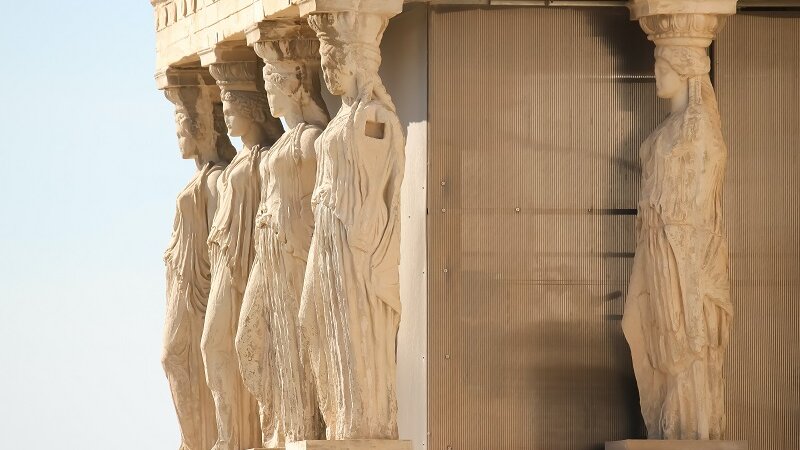Socrates the Trouble-Maker
Episode #2 of the course Ancient Greek philosophy by Dr. Will Buckingham
Welcome to Lesson 2 in this Greek philosophy course. Today, we’re going to be talking about a philosopher who raised such uncomfortable questions for his contemporaries that he was eventually put to death. That philosopher is Socrates (c. 470-399 BCE).
The Stonemason Philosopher
Most of what we know about Socrates comes from the accounts of his followers, Plato and Xenophon. Socrates didn’t make his living as a philosopher. Instead, he worked in a more down-to-earth profession as a stonemason. He was illiterate, brusque, rude, often impatient, a big drinker, and famously ugly. He was not at all worried about upsetting other people in his search for truth.
Know-Nothing or Know-It-All?
If philosophy is the love of wisdom, when it came to Socrates, there was something obsessive about this passion. According to a story in Plato’s Apology, Socrates’s friend Chaerephon wanted to know if anybody was wiser than Socrates. He went to talk to the oracle in the city of Delphi, a priestess who spoke prophecies from the god Apollo. The oracle said nobody was wiser than Socrates.
To Socrates, this didn’t seem right: He knew he was ignorant. So, he went around Athens tracking down all the people who seemed wise and asking them about their wisdom. As he talked to them, he inevitably found that these apparently wise people were, in reality, no less ignorant than he was.
Socrates eventually came to the conclusion that the oracle was right. While nobody at all in Athens knew anything at all, Socrates at least had the advantage of knowing that he knew nothing. It was this that made him the wisest person in Athens.
Appearance, Reality, and Ethics
The natural, or presocratic, philosophers were interested in the principles underlying the world. But Socrates took this distinction between appearance and reality and gave it another twist, applying it to the complexities of human ethics.
In one famous text written by Plato, Socrates is outside the court of Athens where he speaks with Euthyphro, a young man who is taking his father to court for murder. Socrates falls into conversation with Euthyphro, asking why he wants to prosecute his father. Euthyphro says that his father has beaten a slave to death, and it is a matter of piety: In taking his father to court, he is honoring his religious duty.
Socrates cross-examines Euthyphro. “What is piety?” he asks. Socrates doesn’t just want examples of things that are pious and impious. He wants to know what the essence of piety is. He wants to know the underlying reality that lies behind the complexity of everyday appearances.
The word for cross-examination in Greek is elenchus. Socrates was famous for using this process of question-and-answer to show that although we think that we know what we mean when we talk about big ethical issues—goodness, justice, truth, piety, virtue, and so on—but looking more deeply, we realize that we are confused and our thoughts are anything but systematic.
At the end of the dialogue with Euthyphro, the young man admits that he doesn’t know what piety is, and he makes his escape. Before Euthyphro leaves, Socrates replies that he doesn’t know either, and he encourages Euthpyhro to keep on looking for the truth.
The Art of Being Annoying
Using the method of the elenchus, Socrates perfected the art of being annoying. It is not surprising that powerful people in Athens came to dislike him. Even today, people in power often go around talking grandly about ethics and piety and things like that. They would find it deeply irritating if a rough, illiterate stonemason came along to show them that they know nothing at all.
So, it is not surprising that Socrates was taken to court, where he was himself accused of impiety and of corrupting the minds of the young. He was found guilty and sentenced to death by drinking poison made of hemlock.
According to the Crito, one of Plato’s dialogues, Socrates’s friends bribed the prison guards to allow him to flee before the sentence was carried out. But Socrates argued that the laws of Athens had protected him in the past, and it was inconsistent to not follow them now even as they were acting to his disadvantage. So, he gave a final speech about how a philosopher should not fear death, drank the hemlock, and died.
A Faithful Follower
Of all Socrates’s disciples and followers, the most famous—perhaps one of the most famous philosophers of all—was Plato. We will learn more about Plato in the next two lessons.
Recommended resources
• “8-Bit Philosophy” has a great introduction to Socrates.
• One of the best places to start reading about Socrates is Plato’s Phaedo, which tells the story of his death.
Share with friends

